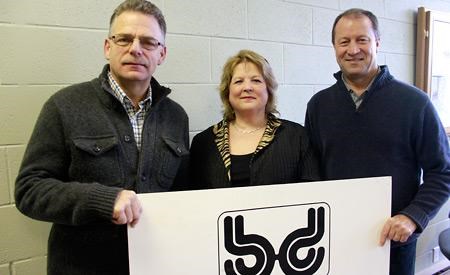Ken McLeish is used to life or death situations. He’s a veteran of BC Ambulance Service having worked as a paramedic in Vancouver. McLeish moved to Powell River seven years ago. He volunteered for Bruce Denniston Bone Marrow Society and is one of 10 individuals from the Upper Sunshine Coast and Vancouver Island who were selected to undergo marrow courier training last year.
McLeish, Ted Boeriu, Chip Paquette and Larry Misner, as well as six couriers from Vancouver Island, were trained to pick up bone marrow or blood stem cells from distant cities and deliver it to waiting recipients, often cancer patients at Vancouver General Hospital (VGH). Most marrow couriers are retired RCMP members, but not all.
No medical expertise is required for the job, but couriers need to be expert travellers. “You just need to be able to think on your feet,” said McLeish, “and be flexible.” When the couriers arrive in the city where they are picking up marrow, they have to be able to quickly navigate the foreign city and check in with the hospital to start the collection of cells.
Sometimes the extraction of blood stem cells takes longer than usual and travel plans change quickly.
The transplanted material has a shelf life of between 48 to 72 hours. Time is never on the side of the courier.
Boeriu, a Texada Island resident, said that when he goes on a trip it’s physically tiring and “an incredible amount of travelling to do in three and a half days.” But, he said, “It’s worth it knowing that people are anxiously awaiting the bone marrow.”
Across Canada, volunteer marrow couriers travelling to pick up donated blood stem cells have gained in popularity since the first program began in Ottawa in 2008 and spread to Toronto, Calgary and now Vancouver.
Vancouver Coastal Health operates the program in partnership with the society at VGH in the Leukemia/Bone Marrow Transplant Program of BC.
Since last June, volunteers of the society have successfully completed 18 trips. Two more trips are scheduled in December. Volunteers generally make three or four trips per year. Sixty per cent of trips are made to Germany because of its up-to-date comprehensive donor database.
Airport security can be tricky as the cooler cannot be X-rayed. Couriers carry letters of explanation written in a number of foreign languages to help them and their special cargo pass through security and customs in a more timely fashion.
“Returning with the cells can be a little touchy because once we have the cells in our transport cooler, that cooler can’t leave our sight or possession until we arrive in the hematology section of VGH,” said McLeish. “I’m attached to it.”
McLeish said that when he was in Germany this October his travel cooler was almost torn off his shoulder during the security check. “It was a moment of anxiety,” said McLeish. His fears abated when a police office reassured him that they wouldn’t send the cooler through the scanner.
Regardless of the travel challenges, McLeish finds his volunteer work very rewarding. Following his latest trip, he said, “I knew that a patient received her cells and she was well on her way to recovery because of this system.”



